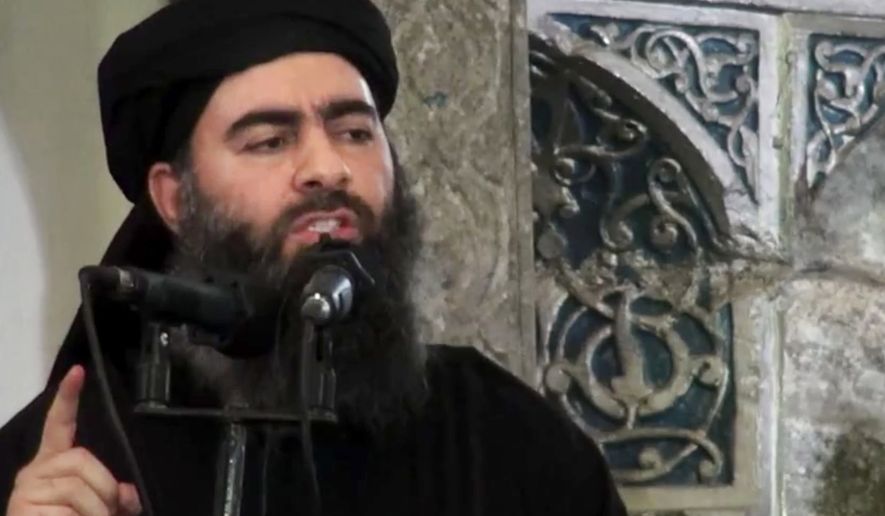An audio recording purportedly circulated this week by reclusive Islamic State leader Abu Bakr al-Baghdadi may be proof that communications have broken down between the terrorist group’s top leaders in Syria and its rank-and-file fighters in the besieged city of Mosul, the Pentagon said Thursday, as coalition forces continued their advance on Iraq’s second-largest city.
Reflecting fears of sectarian strife even after Mosul is liberated, U.S. military officials issued a warning to Shiite militia fighters, saying the world will be watching to prevent a repeat of human rights violations and sectarian violence that marred the campaigns against the Islamic State in the Sunni-dominated cities of Ramadi and Fallujah.
Meanwhile, U.S.-backed Iraqi and Kurdish forces reported gradual progress in the collective — albeit chaotic — assault on Mosul, which has been under control of the Islamic State terrorist group, also known as ISIS and ISIL, since June 2014.
Iraqi troops took a brief pause in the offensive Wednesday to flush out remaining pockets of insurgents in territory cleared by local forces, just as special operations units on the leading edge of the fight broke through the city’s eastern borders.
A rallying speech from al-Baghdadi that surfaced Wednesday offered a rare glimpse into the thinking and priorities of the terrorist group’s leadership. In his first known recorded message since December, al-Baghdadi seemingly pleaded with the 3,000 to 7,500 fighters defending Mosul to hold fast against the coalition assault.
“Holding your ground with honor is a thousand times easier than retreating in shame,” he said, according to Agence France-Presse, which said the recording was released by an outlet affiliated with the Islamic State.
U.S. officials would not confirm the recording’s authenticity but were quick to seize on its message. They said it may be proof of growing discord and confusion between top Islamic State leaders and rank-and-file fighters.
“This is probably excellent evidence that their command-and-control and ability to communicate directly with their fighters and control them has been severely reduced,” said Air Force Col. John Dorrian, the top U.S. military spokesman in Iraq.
“One of the interesting things that we’ve seen in this English translation of this is that Baghdadi is saying, ’Don’t fight amongst yourselves,’” Col. Dorrian told reporters in Washington via teleconference from Baghdad on Thursday.
“This is the type of thing that a leader who’s losing command and control and ability to keep everybody on the same page [would say],” he said.
Although U.S. military officials “don’t believe that it’s going to work,” the colonel said, the Pentagon could not verify the authenticity of the recording.
At the White House, spokesman Eric Schultz said officials were aware of the tape, highlighting what he called a sharp drop in the Islamic State’s fortunes since al-Baghdadi proclaimed a “caliphate” two years ago from Mosul’s Grand Mosque.
“Today, he is in hiding, unable to show his face in public,” Mr. Schultz said.
Militias advance
In the early days of the Mosul assault, Islamic State forces east of the city folded quickly. Three weeks later, however, local forces south of Mosul have met stiffer resistance.
In the west, the Popular Mobilization Units — a collective of Iranian-backed Shiite militias intermingled with other sectarian paramilitary units — are fighting their way toward the major Islamic State hub of Tal Afar.
U.S. commanders in Iraq are deferring to Baghdad’s decision to incorporate the militias into the Mosul fight, but they remain worried that the Shiites’ presence could spark sectarian backlash among Sunnis in and around Tal Afar and across northern Iraq.
The units, which are not officially part of the Iraqi armed forces but do fall under the command of Prime Minister Haider al-Abadi, have played an integral role in the Ramadi and Fallujah campaigns.
But those victories, particularly in Fallujah, have been tainted by reports of widespread human rights abuses and sectarian violence against Sunni civilians by the Shiite PMUs.
“Some [militias] are working very closely with the government of Iraq and the Iraqi Security Forces [but] we absolutely understand that these groups have been involved in acts of terror and human rights abuses,” said Col. Dorrian.
All of the militias under the PMU banner have operated “within the parameters that they have been given,” the colonel said.
“The government of Iraq understands that the world is watching what happens as the popular mobilization forces move into position,” he said, reiterating that those paramilitary units receive no support from U.S. military personnel and trainers backing the Iraqi-led campaign.
“Obviously, we’re not going to help them, [even though] a lot of these other groups are working hand in hand with the government of Iraq to execute the government of Iraq’s plan,” he said.
U.S. officials have long been wary of the PMU’s involvement in the fight against the Islamic State, initiated by former Iraqi Prime Minister Nouri al-Maliki, because of their strong ties to Tehran.
But Iraqi Prime Minister Haider al-Abadi was forced to grant the militias a role in the Mosul fight as a way to secure his tenuous hold on power in Baghdad, where he faces an increasingly hostile Shiite political bloc.
• This article is based in part on wire service reports.
• Carlo Muñoz can be reached at cmunoz@washingtontimes.com.
• Guy Taylor can be reached at gtaylor@washingtontimes.com.




Please read our comment policy before commenting.